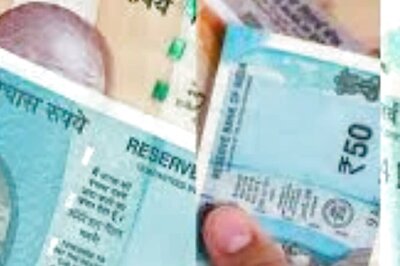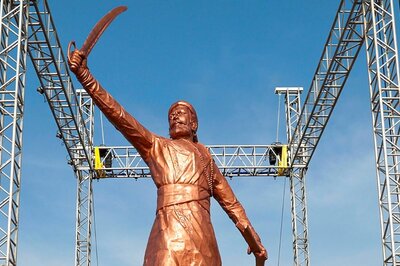
views
"When dictatorship is a fact, revolution becomes a right." - Victor Hugo
On December 17, 2010, the Tunisian police confiscated the wares of Mohamed Bouazizi, a 27-year-old street vendor. He was harassed and humiliated by a municipal official and her aides. None of these creatures had an iota of clue that this seemingly insignificant action, extremely common in the developing world, would change the fate of not just their country but send winds of change across the entire Arab world. The Arab Spring, as it has been christened by the western press, would dominate world headlines in 2011.
Bouazizi set himself on fire in protest. His act became a catalyst for the Tunisian Revolution and the wider Arab Spring, inciting demonstrations and riots throughout Tunisia in protest of social and political issues in the country. The public's anger and violence intensified following Bouazizi's death, leading then-President Zine El Abidine Ben Ali to step down on January 14, 2011. Called the most entrenched of all Arab dictators, Ben Ali's 23-year-old regime collapsed like a house of cards.
A wave of unrest, sparked off by the "Tunisian burning man" (Bouazizi became famous across the Arab world by this name), soon spread to Egypt, Morocco, Jordan, Algeria and Yemen.
On February 11, 2011, Hosni Mubarak, the Egyptian President and often dubbed as "the best US ally in that part of the world" had to step down as millions of protesters laid siege to Cairo's Tahrir Square for 18 consecutive days. Mubarak tried to use force to protect his position of 30 years but it was blown away in the face of popular rage.
The wave of popular discontent led to Algiers lifting a 19-year-old emergency law, the Sudanese President Omar al-Bashir promising the people not to seek re-election, a 40 per cent increase in wages in Lebanon.
Jordan has promised reforms, Oman has made economic concessions and granted law making powers to the elected legislature. Morocco has seen King Mohammed VI making political concessions and promise holding a referendum on constitutional reforms.
Economic concessions have been made by even the King Abdullah of Saudi Arabia. He has announced male-only municipal elections and even approved of women's voting in 2015. Similar concessions have been made by Bahrain.
In Yemen, bitter fighting broke out between forces loyal to Ali Abdullah Saleh, the country's president for 33 years and the Arab world’s longest serving despot, and the protesters. Finally, after massive defections in the ranks of the forces and escalation in violence, Saleh agreed to step down on November 23, 2011, in a deal brokered by the Gulf Cooperation Council in Riyadh.
If these came as as a shock not only to the rulers of these nations but also to the United States and Israel, who had counted on these regimes for pushing their agenda in the region, events in Libya and Syria has brought some succour to policy makers in Tel Aviv and Capitol Hill.
Libya saw the bloodiest of fighting which ended in the collapse of the regime of Colonel Muammar Gaddafi. The fighting has reportedly claimed more than 40,000 lives including the lives of the Colonel and some of his sons.
The Syrian violence has till now claimed more than 4,000 lives (as per a UN estimate) but the Bashar al-Assad regime seems to have more popular support (owing to the sectarian demographic division) than the ones which have collapsed.
While the changes in the Arab world have been largely attributed to widespread repression, corruption, poverty and even to the social networking phenomenon, the connivance of most of the dictatorial regimes with the US and their failure to identify with the Palestinian cause, which put them in collision course with their own citizens, have often been overlooked.
This is especially true for Egypt where the people have, for long, blamed the Mubarak regime for not opening the border with Gaza in spite of an economic blockade forced on the Palestinian Authority area by Israel. There is a strong pan-Islamic sentiment behind the Arab Spring – the inability of Arab regimes to do anything about the 'rights violations' in Palestine and the wars in Iraq and Afghanistan.
In Libya, the West has kept with its tradition. It has supported armed religious groups who are in power today. Armed western interventions in the Muslim world have always been directed against secular regimes (read Najib's Afghanistan and Saddam's Iraq). They have all seen the rise of politico-religious forces.
One would have expected the West to learn good lessons from its Afghan experience. However, Libya showed otherwise. Already there are reports how Islamic fundamentalist and terror groups have benefited from the loot of Gaddafi's armouries.
The West i.e Europe and the US are in the doldrums themselves. Henry Ford, the famous automobile entrepreneur had once remarked: "It is well enough that people of the nation do not understand our banking and monetary system, for if they did, I believe there would be a revolution before tomorrow morning." But it seems people have become more aware today.
The massive economic downturn of 2008 effected government interventions in the US in the form of fiscal stimulus. If people in the US had thought that the reckless banking practices would lead to a degree of introspection within the bankers and policy makers, the next two years saw a growing number of people realising that the banking sector believed in privatising profits and socialising losses.
There was another growing realisation – that the average American had no say in policy decisions which always invariably favours the financial institutions and corporates.
On September 30, more than 20000 Americans marched in New York City, crying out slogans like "People, not profit" in a sudden escalation of the Occupy Wall Street protest that started on September 17 with just 1000 pairs of walking feet and 200-odd people staying overnight in the city's Zuccotti Park, ironically more well known as Liberty Plaza Park.
By October 9, protests spread to over 70 US cities including Washington DC, Los Angeles, San Francisco, Chicago, Atlanta, Miami, Denver, Kansas City, Boston, Oakland etc.
The Occupy Wall Street protests have questioned not only the role of finance capital, the basic unit of a debt-ridden global capitalist system, but also the disconnect the average American has with the political decision-making process in that country which is dictated by lobbies loaded with money and the promise of new business.
The participants at this protest are mainly protesting against social and economic inequality, corporate greed, the influence of corporate money and lobbyists on government. Adbusters, the Canadian group which first gave the call for such a protest, states that, "Beginning from one simple demand – a presidential commission to separate money from politics – we start setting the agenda for a new America."
As crowds swelled at the head of slogans like "We are the 99 per cent" and "People, not profits," the police resorted to pepper spraying activists in New York. More than 300 were arrested. A large group of war veterans were beaten black and blue by the police in the Occupy Boston leg; similar incidents have been reported from Oakland.
Faced with years of living in debt, which, according to many, has become mathematically impossible to repay, Europe is faced with a liquidity crisis, virtually no growth and record unemployment. From Athens to Rome, people have clashed with riot police, burning cars and smashing property. Police surveillance choppers have become regular sights in Italy. Prime ministers and presidents have come and gone. Suddenly Karl Marx has become a best-selling author in Germany.
India's politicians, too, have been dealt a rude wake up call when a small anti-corruption movement started by some seemingly innocuous activists captured the imagination of the country's growing middle class.
Combining all these strands with the overriding theme dominating the Durban Climate Summit, 2011 has been a year of questioning the way things are. And that does not stop at casting a critical eye on the merits of nuclear power or dwelling upon the inadequacy of Bhopal victims' compensation.
2011 has also been a year when the undisputed reign of capital has been dealt a reality check. It has even prompted Dr Nouriel Roubini, the New York University professor of economics, who has worked in various capacities at IMF, World Bank and the US Federal Reserve, to say, "Karl Marx had it right".
####




















Comments
0 comment